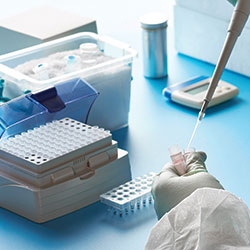By Ethan Covey
Cytomegalovirus (CMV) is a globally widespread virus that becomes latent after primary infection—over half of all adults have been infected with CMV by 40 years of age—but can frequently reactivate and cause disease, allograft failure and death among immunocompromised solid-organ transplant recipients.

In the absence of prophylaxis, between 20% and 60% of people receiving kidney transplants develop CMV infection or disease (Transpl Int 2022;35:10528).
“Given the toxicities and costs of antivirals for CMV prophylaxis, there is growing interest in assays that measure CMV-specific T-cell immunity (TCI), which may predict inherent protection against clinical infection,” explained Nouf Almaghlouth, MD, MPH, an infectious diseases fellow at the Warren Alpert Medical School of Brown University, in Providence, R.I.
In the first blinded, prospective study to date of the Viracor CMV TCI Panel (TCIP), the only commercially available assay in the United States that measures CMV-specific ]TCI, the TCIP exhibited good performance in predicting protection from CMV events, according to an abstract presented by Dr. Almaghlouth (poster 631) at IDWeek 2023.
Investigators from Brown University and the Rhode Island Hospital Division of Infectious Diseases, led by Dr. Almaghlouth, enrolled a total of 46 kidney transplant recipients in the two arms of the trial. For arm A (38), they prospectively enrolled consecutive donor (D) or recipient (R) CMV-seropositive kidney transplant recipients, with the plan to conduct TCIP testing monthly until either discontinuation of prophylaxis with valganciclovir or the primary outcome, CMV DNAemia, prompting initiation of treatment. For arm B, they prospectively enrolled transplant recipients with low-level untreated DNAemia, or after completion of treatment with valganciclovir, to evaluate assay predictive values for progression or relapse of CMV infection, respectively. (Treating providers were unaware of TCIP results.)
The positive predictive values of CD4+ and CD8+ T-cell positivity greater than 0.2% on the assay for CMV protection were 96.3% for the primary outcome, 92.6% for any DNAemia and 100% for DNAemia greater than 1,000 IU/mL.
“The TCIP could be a useful adjunct tool in clinical decision making regarding initiation or extension of CMV prophylaxis or treatment, as well as adjustments in immunosuppression,” Dr. Almaghlouth said.
{RELATED-HORIZONTAL}